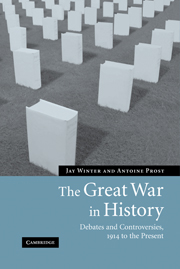Book contents
- Frontmatter
- Contents
- Preface to the English edition
- Introduction
- 1 Three historiographical configurations
- 2 Politicians and diplomats: why war and for what aims?
- 3 Generals and ministers: who commanded and how?
- 4 Soldiers: how did they wage war?
- 5 Businessmen, industrialists, and bankers: how was the economic war waged?
- 6 Workers: did war prevent or provoke revolution?
- 7 Civilians: how did they make war and survive it?
- 8 Agents of memory: how did people live between remembrance and forgetting?
- 9 The Great War in history
- Bibliography
- Index
- Studies in the Social and Cultural History of Modern Warfare
8 - Agents of memory: how did people live between remembrance and forgetting?
Published online by Cambridge University Press: 05 June 2012
- Frontmatter
- Contents
- Preface to the English edition
- Introduction
- 1 Three historiographical configurations
- 2 Politicians and diplomats: why war and for what aims?
- 3 Generals and ministers: who commanded and how?
- 4 Soldiers: how did they wage war?
- 5 Businessmen, industrialists, and bankers: how was the economic war waged?
- 6 Workers: did war prevent or provoke revolution?
- 7 Civilians: how did they make war and survive it?
- 8 Agents of memory: how did people live between remembrance and forgetting?
- 9 The Great War in history
- Bibliography
- Index
- Studies in the Social and Cultural History of Modern Warfare
Summary
In April 1920, the casket of the French unknown soldier was chosen at Verdun. Twelve years later, the ossuary of Douaumont, containing the mixed remains of French and German soldiers who died there, was inaugurated in the presence of the President of the Republic in 1932. The practice and discourse of remembrance unfolded without reference to historians or their activities. In the interwar years, the language of commemorative practices was formed and used by others: by political leaders, always ready to conjure up the spectre of those who died for ‘us’; by anciens combattants, and their varied organizations, by the nationalist Stahlhelm and the socialist Reichsbanner in Germany, by the conservative American Legion and British Legion, and by a host of French associations which adopted a moral discourse in preference to a party political one.
In September 1984, the President of the Republic François Mitterrand and the German Chancellor Helmut Kohl came together to Verdun. There they joined hands to affirm the future of an integrated Europe, built over the ruins of the disintegrated Europe which perished at Verdun and a dozen other sites of carnage during the 1914–18 war. The commemorative practices carried on, but now the language of remembrance was both a social practice, shared by millions of ordinary people, and an object of scholarly activity. What historians began to do was to historicize a ritual which combined elements of the sacred with lessons in citizenship directed in particular at the young.
- Type
- Chapter
- Information
- The Great War in HistoryDebates and Controversies, 1914 to the Present, pp. 173 - 191Publisher: Cambridge University PressPrint publication year: 2005
- 1
- Cited by



